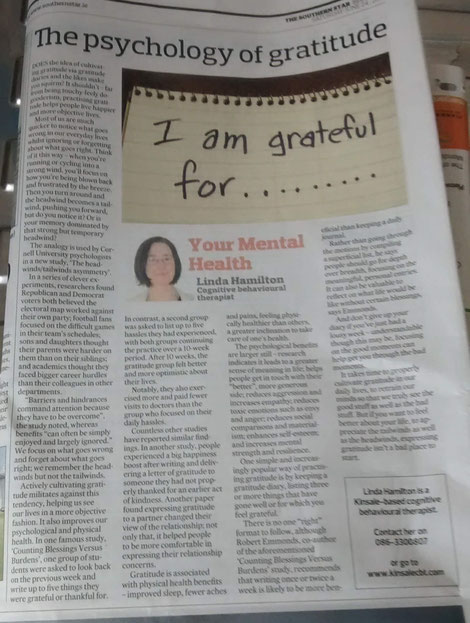
Does the idea of cultivating gratitude via gratitude diaries and the likes make you squirm? It shouldn’t – far from being touchy-feely do-gooderism, practising gratitude helps people live happier and more objective lives.
Most of us are much quicker to notice what goes wrong in our everyday lives whilst ignoring or forgetting about what goes right. Think of it this way – when you’re running or cycling into a strong wind, you’ll focus on how you’re being blown back and frustrated by the breeze. Then you turn around and the headwind becomes a tailwind, pushing you forward, but do you notice it? Or is your memory dominated by that strong but temporary headwind?
The analogy is used by Cornell University psychologists in a new study, ‘The headwinds/tailwinds asymmetry’. In a series of clever experiments, researchers found Republican and Democrat voters both believed the electoral map worked against their own party; football fans focused on the difficult games in their team’s schedules; sons and daughters thought their parents were harder on them than on their siblings; and academics thought they faced bigger career hurdles than their colleagues in other departments.
“Barriers and hindrances command attention because they have to be overcome”, the study noted, whereas benefits “can often be simply enjoyed and largely ignored.” We focus on what goes wrong and forget about what goes right; we remember the headwinds but not the tailwinds (continued below...)
Actively cultivating gratitude militates against this tendency, helping us see our lives in a more objective fashion. It also improves our psychological and physical health. In one famous study, ‘Counting Blessings Versus Burdens’, one group of students were asked to look back on the previous week and write up to five things they were grateful or thankful for. In contrast, a second group was asked to list up to five hassles they had experienced, with both groups continuing the practice over a 10-week period. After 10 weeks, the gratitude group felt better and more optimistic about their lives. Notably, they also exercised more and paid fewer visits to doctors than the group who focused on their daily hassles.
Countless other studies have reported similar findings. In another study, people experienced a big happiness boost after writing and delivering a letter of gratitude to someone they had not properly thanked for an earlier act of kindness. Another paper found expressing gratitude to a partner changed their view of the relationship; not only that, it helped people to be more comfortable in expressing their relationship concerns.
GRATITUDE AND HEALTH
Gratitude is associated with physical health benefits – improved sleep, fewer aches and pains, feeling physically healthier than others, a greater inclination to take care of one’s health. The psychological benefits are larger still – research indicates it leads to a greater sense of meaning in life; helps people get in touch with their “better”, more generous side; reduces aggression and increases empathy; reduces toxic emotions such as envy and anger; reduces social comparisons and materialism; enhances self-esteem; and increases mental strength and resilience.
One simple and increasingly popular way of practising gratitude is by keeping a gratitude diary, listing three or more things that have gone well or for which you feel grateful. There is no one “right” format to follow, although Robert Emmonds, co-author of the aforementioned ‘Counting Blessings Versus Burdens’ study, recommends that writing once or twice a week is likely to be more beneficial than keeping a daily journal. Rather than going through the motions by compiling a superficial list, he says people should go for depth over breadth, focusing on the meaningful, personal entries. It can also be valuable to reflect on what life would be like without certain blessings, says Emmonds.
And don’t give up your diary if you’ve just had a lousy week – understandable though this may be, focusing on the good moments can help get you through the bad moments.
It takes time to properly cultivate gratitude in our daily lives, to retrain our minds so that we truly see the good stuff as well as the bad stuff. But if you want to feel better about your life, to appreciate the tailwinds as well as the headwinds, expressing gratitude isn’t a bad place to start.